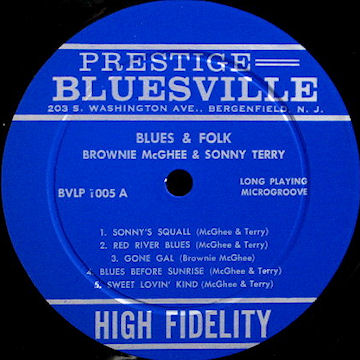Terry and McGhee were contemporaries of Johnson's, but from a different region. Johnson was from the Mississippi Delta, as were the blues singers like Muddy Waters, Howlin' Wolf and Sonny Boy Williamson who migrated to the Midwest, mostly Chicago. Terry and McGhee were from the East Coast, the Piedmont plateau, which runs more or less parallel to the Appalachian mountain range across several southern states, and which gave its name to the Piedmont style of blues.
The most important progenitor of the Piedmont blues style was Blind Boy Fuller, both McGhee and Terry worked with him, Terry as his harmonica-playing sidekick, McGhee leading him and absorbing his guitar style. All three of them had become full time musicians, playing on the street or for local dances, because physical disabilities left them with no other career choices. Fuller and Terry were both blind; McGhee's legs were crippled by polio.
Fuller was, among other things, a master of the double entendre dirty blues, the composer of such classics as "Keep on Truckin', Mama" and "What's that Smells Like Fish?" Like Robert Johnson, he had been sought out by John Hammond to appear in his 1938 "From Spirituals to Swing" concert at Carnegie Hall (presumably to do cleaner material), and like Johnson, he didn't make it. In both cases, in true blues fashion, there was a woman involved. Johnson was dead, poisoned by a jealous husband; Fuller was in prison for shooting his wife in the leg. Terry took his place, and stayed in New York.
The two of them began their guitar-harmonica partnership in New York in the early 1940s. Later in the decade, they drifted apart. McGhee tried his hand at rhythm and blues, following the lead of his brother, Stick McGhee, who had a substantial R&B hit with "Drinkin' Wine Spo-Dee-O-Dee." Terry found himself on Broadway, in the cast of the musical Finian's Rainbow, about an Irish family (and leprechaun) in the segregated South.
In the 1950s, they resumed their professional partnership, which was to last over the next several decades. Like Lead Belly before them, they learned quickly that the audience for folk blues in New York was white leftists, and they adapted their style to that audience. Terry frequently collaborated with Woody Guthrie. They developed a repertoire of old songs adapted to their style, and songs of their own composing, that--unlike the electric blues that Southern transplants to Chicago and Detroit were developing--remained acoustic and fit in well with the folk music scene that was developing around Woody Guthrie, Pete Seeger and their ilk.
Terry wrote a song about Lead Belly -- "Me and Huddie Ledbetter, Huddie Ledbetter was my friend," which McGee adapted to "Me and old Sonny, Sonny Terry was my friend," but from many accounts, that was not strictly true. They did not get along. But unlike the rock groups that came
along in the late 20th century, that let personality and ego clashes break them up just when they were reaching their pinnacle of success, Terry and McGhee kept a successful business relationship going, and McGhee kept singing about how old Sonny was his best friend.
Their sessions for Bluesville mostly featured the same songs, and the same arrangements, that they recorded for Folkways and Stinson and whatever other folk-oriented labels wanted to pick them up. Roy Haynes joins them on a few tracks, but essentially they resisted the Prestige Bluesville treatment. And that's mostly good. I love the Bluesville albums that put traditional bluesmen together with jazz musicians from the Prestige orbit, but McGhee and Terry had a formula that worked, and went on entertaining people for a great many years, so why mess with it?
These sessions were released on a series of Bluesville albums: Down Home Blues (also on Prestige Folklore, a short-lived Prestige venture that did mostly re-releases in 1963-64), Blues And Folk, Blues All Round My Head, Blues In My Soul. There were some 45 RPM releases: "Let Me Be Your Little Dog" / "Stranger Here," "Too Nicey Mama" / "Pawn Shop," and "Beggin' And Cryin'" / "Freight Train."



No comments:
Post a Comment